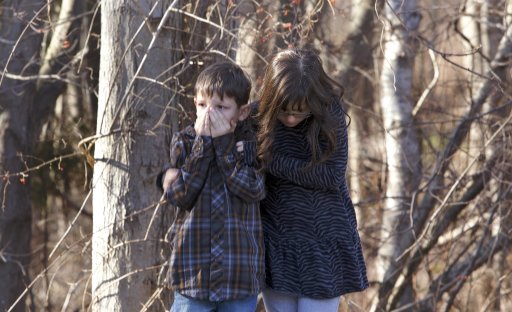
(this post was written by rev. mark buetow and posted at higher things)
"When Herod saw that he was deceived by the wise men, he was exceedingly angry; and he sent forth and put to death all the male children who were in Bethlehem and in all its districts, from two years old and under, according to the time which he had determined from the wise men. Then was fulfilled what was spoken by Jeremiah the prophet, saying: "A voice was heard in Ramah, Lamentation, weeping, and great mourning, Rachel weeping for her children, Refusing to be comforted, Because they are no more." (Matthew 2:16-18)
“Why?” “Why did God let this happen?” “What is wrong with people?” Those are the questions that the mothers in Bethlehem might have asked when the soldiers of King Herod killed their children. Those are questions we’ll hear in Connecticut now after the death of 27 people, including 18 children at a shooting that took place at an elementary school. An elementary school! Little kids! Children! How? Why? What do you say?
The one good thing about the death of the children of Bethlehem is that Jesus got away. He got away so that He could grow up and be the Savior of those children, the Savior of the children in Connecticut that just died and the Savior of everyone. Even the Savior of the man who did this. Because, after all, it’s a person who did this. Evil. Sin. These are the things that cause people to do horrible things. Let’s remember that. God didn’t do this. Sin did this. We’ll weep for the children and their families. We should weep for the shooter and whatever it was that led him to do it: anger, rage, maybe mental illness. It doesn’t really matter. We weep because we see what the fallen world is really like.
What could God possibly have to say to parents who are cradling their dead children in their arms and the first responders who have to clean up the mess, and the parents and children who will never be the same for having been through this? What could God possibly have to say to the mothers of Bethlehem who were weeping in fulfillment of a prophecy? Here we are with nothing to say. A loss for words. Shaking our heads. What does God have to say to us?
These words of Jesus come to mind “In this world you will have trouble. Take heart. I have overcome the world.” (John 16:33). Jesus doesn’t save us by fixing this world. He saves us out of it for eternal life. We stare stunned at the story that children have died and right before we celebrate the birth of the Son of God, as a child! And then we begin to see what God has done. God came as a child. To be born. To grow up. To suffer and die. Forsaken by the Father. Nailed to the cross. Hanging there bleeding and dying because of what we’ve done. What sin has done. What it has made us. And by the blood and water that flows from His side, into the font, He makes us His children. To die with Him. To rise with Him. To have such a promise that there is nothing in this world that can happen to us that can take that away. Jesus has overcome school shootings and the horrors inflicted upon children and others. He has overcome such things not in the way we would like, by simply punishing them and keeping us safe. He has overcome the world by actually taking on sin and destroying its power forever. And there’s more. He rose. His resurrection is the promise and guarantee that death never, ever gets the last word.
When some terrible disasters happened in His day, Jesus said, “do you think that they were worse sinners than all other men who dwelt in Jerusalem? I tell you, no; but unless you repent you will all likewise perish." (Luke 13:4-5). These words remind us that when we see tragedies like this, there is no blaming and finger-pointing and name-calling and wondering. There is only repentance. Repentance is recognizing that it can only be Christ who delivers us from such evil because left to ourselves, this is all we’ve got. But in Him, we are saved from all these things.
Things have changed forever for the people who have been a part of this horror today. But Jesus Christ is the same yesterday, today and forever. It is that promise which will be the truest comfort for those who suffer such things. The Lord grant them His mercy and the healing that Christ alone can bring to them through their bitter tears.
"They shall neither hunger anymore nor thirst anymore; the sun shall not strike them, nor any heat; for the Lamb who is in the midst of the throne will shepherd them and lead them to living fountains of waters. And God will wipe away every tear from their eyes."(Revelation 7:16-17).
+++





